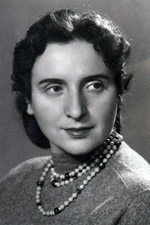
NEW YORK (Press Release)—National Yiddish Theatre Folksbiene (NYTF) kicks off its Yiddish Women Playwrights Festival with a virtual reading of Chava Rosenfarb’s play The Bird of the Ghetto (Der Foygl fun Geto), the first time the play will be presented in the language in which it was written, Yiddish. Audiences can stream the event at 11 a.m. (Pacific Time), Sunday, April 18 through 11 a.m. Thursday April 22 at 2:00 PM ET.
The Bird of the Ghetto chronicles the attempted Vilna Ghetto uprising and the tragic story of Jewish resistance leader Itsik Vitenberg, commander of the United Partisan Organization. The presentation coincides with the 78th anniversary of the beginning of the Warsaw Ghetto Uprising on April 19, 1943.
Audiences can access the play for free via https://nytf.org/bird.
In July 1943, the Nazi occupiers of the Vilna Ghetto demanded that leader Itsik Vitenberg be turned over. Yakov Gens, the head of the Vilna Jewish Council (Judenrat), turned Vitenberg over to the Gestapo, but he was rescued by his fellow partisans. The Gestapo again demanded that Vitenberg be turned over, threatening the complete liquidation of the Vilna Ghetto and its remaining 20,000
inhabitants.
The FPO wanted the crisis to serve as the spark to ignite an uprising, but without the popular support of the community, Vitenberg was forced to sacrifice himself, and he surrendered to the Nazis. He died within days in Gestapo custody. The Vilna Ghetto was liquidated three months later.
The Bird of the Ghetto is the only play by Chava Rosenfarb, who is considered one of the greatest postwar Yiddish writers. While performed in Rosenfarb’s lifetime in English and in Hebrew, this is the first time in its original Yiddish.
Born in Lodz, Rosenfarb began writing at age eight. In the Lodz ghetto, her poetry brought her to the attention of Simkha-Bunim Shayevitsh, author of the epic poem Lekh Lekho, who became her mentor and introduced her to the writers’ group in the ghetto. Upon liquidation of the ghetto (August 1944), Rosenfarb was deported to Auschwitz, and then to Sasel and finally Bergen-Belsen, where she was liberated. In 1950, she immigrated to Montreal. Her literary output after 1947 was prodigious, including four volumes of poetry.
The Bird of the Ghetto is the inaugural production in NYTF’s Yiddish Women Playwrights Festival, a series celebrating Yiddish plays by women writers. While NYTF has a history of championing women directors, this is the first time NYTF will present a dramatic play written by a woman. Following The Bird of the Ghetto, the festival will feature readings of plays by Kadye Malodowsky, Marie Lerner, and Miriam Karpilove. The series is curated by NYTF Literary Manager Sabina Brukner.
“Celebrating this moving work from Chava Rosenfarb is an ideal entrée to our Yiddish Women Playwrights Festival,” said NYTF Artistic Director Zalmen Mlotek. “While women artists and directors are a proud part of NYTF’s heritage, it is important that we also give women playwrights center stage at the National Yiddish Theatre Folksbiene.”
“As we commemorate the anniversary of the Warsaw Ghetto uprising, the true story behind The Bird of the Ghetto, is a moving testament to the bravery and resilience of the Jewish resistance during the Holocaust,” said NYTF Associate Artistic Director and Producer of The Bird of the Ghetto Motl Didner.
Appearing in the production are: Rachel Botchan; Rebecca Brudner; Spencer Chandler; Motl Didner; Kirk Geritano; Avi Hoffman; Maya Jacobson; Daniel Kahn; Lea Kalisch; Rebecca Keren; Avram Mlotek; Lauren Schaffel; Dylan Seders Hoffman; Tatiana Wechsler; Hy Wolfe; and, Mikhl Yashinsky. Daniel Kahn will perform a song in tribute to the bravery of Itsik Vitenberg.
The creative team includes: Goldie Morgentaler, translator; Motl Didner, producer, videographer, editor; Suzanne Toren, director; Dylan Seders Hoffman, assistant director; and Eileen F. Haggerty, production stage manager/stage directions.
*
Preceding provided by National Yiddish Theatre Folksbiene.